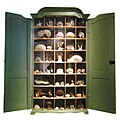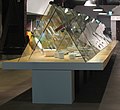Portal:Museums
The Museums Portal
A museum (/mjuːˈziːəm/ mew-ZEE-əm) is an institution dedicated to displaying and/or preserving culturally significant objects. Many museums have exhibitions of these objects on public display, and some have private collections that are used by researchers and specialists. Compared to a library, a museum hosts a much wider range of objects and usually focus around a specific theme such as the arts, science, natural history, local history, and other topics. Public museums that host exhibitions and interactive demonstrations are often considered to be tourist attractions, and many museums attract large numbers of visitors from outside their host country, with the most visited museums in the world regularly attracting millions of visitors annually.
Since the establishment of the earliest known museum in ancient times, museums have been associated with academia and the preservation of rare items. Museums originated as private collections of interesting items, and not until much later did the emphasis on educating the public take root. (Full article...)
Selected museum
The Museum of Bad Art (MOBA) is a privately owned museum whose stated aim is "to celebrate the labor of artists whose work would be displayed and appreciated in no other forum". It was originally in Dedham, Massachusetts, and is currently in Boston, Massachusetts. Its permanent collection includes over 700 pieces of "art too bad to be ignored", 25 to 35 of which are on public display at any one time.
MOBA was founded in 1993, after antique dealer Scott Wilson showed a painting he had recovered from the trash to some friends, who suggested starting a collection. Within a year, receptions held in Wilson's friends' home were so well-attended that the collection needed its own viewing space. The museum then moved to the basement of a theater in Dedham. Explaining the reasoning behind the museum's establishment, co-founder Jerry Reilly said in 1995: "While every city in the world has at least one museum dedicated to the best of art, MOBA is the only museum dedicated to collecting and exhibiting the worst." To be included in MOBA's collection, works must be original and have serious intent, but they must also have significant flaws without being boring; curators are not interested in displaying deliberate kitsch.
MOBA has been mentioned in dozens of off-the-beaten-path guides to Boston, featured in international newspapers and magazines, and has inspired several other collections throughout the world. Deborah Solomon of The New York Times Magazine noted that the attention the Museum of Bad Art receives is part of a wider trend of museums displaying "the best bad art". The museum has been criticized for being anti-art, but the founders deny this, responding that its collection is a tribute to the sincerity of the artists who persevered with their art despite something going horribly wrong in the process. According to co-founder Marie Jackson, "We are here to celebrate an artist's right to fail, gloriously." In a chat with the Sunn on how to identify bad art, MOBA's curator Michael Frank says, "Here at the Museum Of Bad Art (MOBA) we collect art that we believe was created in a serious attempt to make art but in which, either in the execution or original concept, something has gone terribly wrong. Rather than simply amateurish, the resulting image must be, for one reason or another, compelling to be considered museum-worthy. Some of the most interesting pieces in our collection are ones that show that the artist had some technical skill, but made some questionable decisions such as over-the-top imagery." (Full article...)
Selected interior image
Selected general article

Museum education is a specialized field devoted to developing and strengthening the education role of informal education spaces and institutions such as museums.
In a critical report called Excellence and Equity published in 1992 by the American Association of Museums, the educational role of museums was identified as the core to museums' service to the public. As museum education has developed as a field of study and interest in its own right, efforts have been made to record its history and to establish a research agenda to strengthen its position as a discipline in the wider work of museums. (Full article...)
Did you know...
- ... that the New Zealand stonefly Stenoperla prasina was the five millionth specimen digitised by the Natural History Museum in London?
- ... that visitors to the Museum of Sexual Cultures can make offerings to a statue of Priapus?
- ... that Gracie Mansion became New York City's mayoral residence after serving as a public toilet and a museum?
- ... that the divers who found the c. 9th-century Tully Lough Cross in 1986 were convicted for trying to sell it to American museums?
- ... that the Felix M. Warburg House was converted into the Jewish Museum after nearly being replaced by apartments?
- ... that Saint Rose Catholic Church was moved from the ghost town of Fleetwood, Oregon, to the Fort Rock Valley Historical Homestead Museum in 1988?
Get involved
For editor resources and to collaborate with other editors on improving Wikipedia's Museums-related articles, see WikiProject Museums.
Selected exterior image
Selected type of museum

An agricultural museum is a museum dedicated to preserving agricultural history and heritage. It aims to educate the public on the subject of agricultural history, their legacy and impact on society. To accomplish this, it specializes in the display and interpretation of artifacts related to agriculture, often of a specific time period or in a specific region. They may also display memorabilia related to farmers or businesspeople who impacted society via agriculture (for example, size of the land cultivated as compared to other farmers) or agricultural advances (for example, technology implementation).
An agricultural museum is said to be diachronic if it presents the entire narrative associated with subject of agriculture within its walls, or to be synchronic if it limits its displays to a single experience. (Full article...)
Subcategories
Subtopics
Lists
- Museums
- Most visited museums (by region)
- Art museums: most visited, largest
Types
- Art museum
- Agricultural museum
- Archaeology museum
- Architecture museum
- Artillery museum
- Aviation museum
- Biographical museum
- Cabinet of curiosities
- Ceramics museum
- Children's museum
- Community museum
- Computer museum
- Design museum
- Dime museum
- Ecomuseum
- Economuseum
- Ethnographic village
- Farm museum
- Fashion museum
- Folk museum
- Food museum
- Green museum
- Hair museum
- Hall of Memory
- Heritage centre
- Historic house museum
- Human rights museum
- Imaginarium
- Interpretation centre
- Jewish museum
- Lapidarium
- Lighthouse museum
- Living museum
- Local museum
- Maritime museum
- Migration museum
- Mobile museum
- Museum ship
- National history museum
- Natural history museum
- Open-air museum
- Palace museum
- Postal museum
- Prefectural museum
- Print room
- Private museum
- Regimental museum
- Schatzkammer
- Science fiction libraries and museums
- Science museum
- Sex museum
- Sculpture garden
- Technology museum
- Textile museum
- Torture museum
- Toy museum
- Transport museum (list)
- University museum
- Virtual museum
- Wax museum
- Writer's home
Related
Associated Wikimedia
The following Wikimedia Foundation sister projects provide more on this subject:
-
Commons
Free media repository -
Wikibooks
Free textbooks and manuals -
Wikidata
Free knowledge base -
Wikinews
Free-content news -
Wikiquote
Collection of quotations -
Wikisource
Free-content library -
Wikiversity
Free learning tools -
Wiktionary
Dictionary and thesaurus






































































